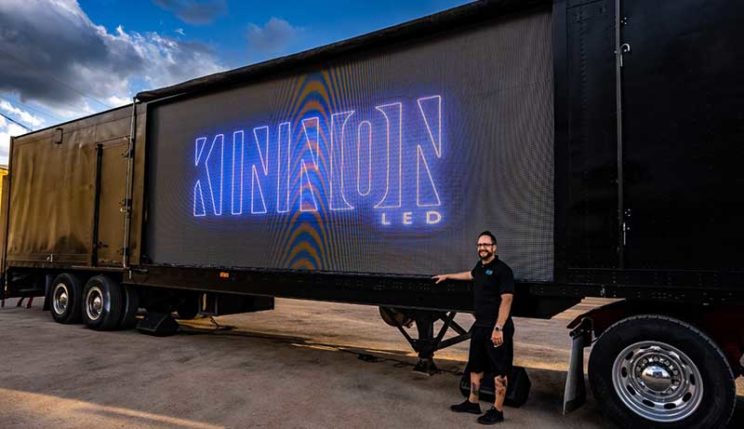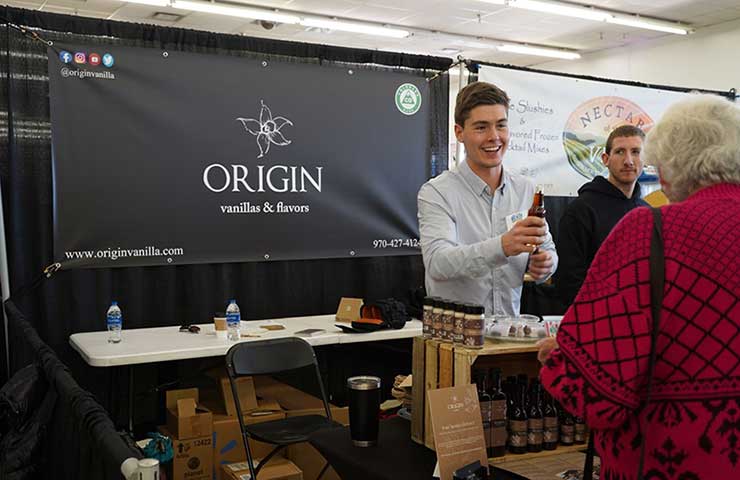
In summer 2020, small business owner Michael Blecha had to take a hard look at his business, Kinnon Entertainment. The concert production industry was poised to have its best year ever just a few months earlier. More than 600 venues booked Kinnon through December—a record-breaking year for Blecha. It was a long time coming for the business, which was founded in 2009 and slowly growing to become a major player in Colorado and the western states. When the COVID-19 pandemic’s early economic strain began to show itself, Blecha initially took a “wait and see” approach, hoping that by winter, concerts would be back.
Blecha took out a Paycheck Protection Program (PPP) loan to keep his eight full-time and 20 part-time staff working. He hoped that everything would blow over by summer. It didn’t, and around July he was forced to acknowledge that unless his business transformed quickly, it wouldn’t exist by Christmas. “We were 100 percent shut down. When a sandwich shop closes their doors in-person, they can do takeout and delivery. That option doesn’t exist for live events. I saw my events get cancelled one by one until there was basically nothing left on the 2020 calendar. I realized I needed to pivot to keep my employees and make money,” he said.
Small businesses everywhere experienced their own version of Blecha’s dilemma. The popular PPP distributed billions of dollars for payroll but was no substitute for an active marketplace. Elsewhere in Colorado, a young business called Origin Vanilla was also abruptly cut off from its customers during the summer.

In 2019, Zach Schwindt and his business partner created Origin Vanilla, which imports vanilla from Indonesia and Malaysia. They sold direct to consumers through small trade shows and farmer’s markets in Colorado. Origin Vanilla partners directly with local farmers in origin countries, which bypasses intermediaries, thereby disrupting the traditional supply chain. Schwindt explains that this direct seller relationship allows considerable reinvestment in origin countries’ farmer protection and infrastructure.

Like Kinnon Entertainment, Origin Vanilla had no physical storefront and relied on social venues to connect with customers. By May 2020, most Colorado social gatherings were suspended. His business was so young, Schwindt had never given himself a paycheck and did not even qualify for a PPP loan at the time. Faced with a business crisis, Schwindt fell back on the one resource that he still had: the vanilla itself. Origin Vanilla could obtain it below most competitors’ cost due to personal relationships with growers. Schwindt asked himself: Could they sell the raw ingredients to other businesses? He began to sketch out plans for a new business-to-business (B2B) model, but he needed help to plan and finance the pivot. He was about to get that help.
That summer, Rural Community Assistance Corporation’s (RCAC) Loan Fund team, which processed PPP loans for businesses that could not access funds through traditional lenders, worked practically around the clock. RCAC led community development financial institution (CDFI) PPP lending, distributing more than $9 million in PPP loans by August 2020 and continued to lend well into 2021. But the team had already turned its attention toward the next big challenge. Namely, what would businesses need to re-emerge in an uncertain economy?
The answer was RCAC’s Re-Emerging Loan Fund (RELieF). RELieF provides loans and at the same time addresses strategic pivots that many businesses need to make during and after the pandemic. RELieF pairs low-interest loans with one-on-one business coaching for every borrower. The coaching includes a strategic business evaluation to determine if pre-pandemic business models need to change. RCAC conducted outreach across its network in early fall 2020. The first and most logical step was to start with PPP borrowers. RCAC created webinars to discuss the best ways to access PPP loans. The team also conducted outreach to co-working spaces, startup hubs and local Small Business Administration (SBA) representatives.
It was around this time that Blecha heard about RCAC through a local SBA contact. Blecha had fallen back on an old side-hustle to keep his employees working: Setting up audio and video for livestreams, video conferences and smart home setups. He even created a new company branch, called Kinnon AV. This led Blecha to take note of an opportunity in the AV industry: the need for mobile LED screens. In the pandemic, communicating with the public through advertising became paramount, and many businesses needed billboards and LED screens to reach customers. Blecha began to source and develop his own brand of large LED screens to lease to advertisers. He initially started producing his own screen line overseas but quickly moved production to the U.S. It represented a major reorganization of his resources.

“For the first two months, we had to change everything. We installed a new inventory management system, a new scheduling system, a new invoicing system. I installed production managers. I totally moved all my focus to what is now Kinnon LED,” Blecha said.
Blecha created two new arms for his company in months: Kinnon AV and then Kinnon LED. Both came with steep initial costs. Blecha says a technical upgrade of his company’s systems was long overdue. He also needed to hire a middle management layer to take the lead on training and retaining staff. Losing staff was a major threat to both Kinnon arms, as it would be a challenge to find replacements with their experience. Blecha knew that when concerts returned, he would need as many industry veterans as possible.
Blecha took all these concerns to his business coaching sessions with RCAC Economic Development Specialist Bo Blodgett. While Blecha prepared business forecasts and strategic plans for the RELieF application, he says Blodgett poured over each one and asked the tough questions.
“I had never done any formal business planning. The SBA had given me some forms to put down things like my three- and five-year business plans, but Bo [Blodgett] came along and really reverse-engineered it. He had a no BS approach and helped find places where my financial planning needed more. He was really helpful.”
With Blodgett, Blecha carved out budgets for new hires and sharpened his revenue projections. He took a $25,000 loan from RELieF in April 2021. The loan terms allowed Blecha to draw the funds on an “as needed” basis, like a line of credit. But the AV side of the business took off so rapidly, he did not need to use it initially. He describes it now as his “rainy day fund,” which he will need when his LED business begins to scale.
Blodgett says that every entrepreneur is at a different step in their journey, so every meeting must be personalized. “A lot of it deals with finding capital funding, chasing down loans and grants. And a lot of it is helping them understand their cash flows, understanding how their sales relate to their expenses and meeting their financial obligation month to month.”
Since January 2021, RCAC coached 30 small businesses, and it adds more every month. One of those was with Schwindt at Origin Vanilla to flesh out his B2B pivot. Schwindt and Blodgett identified several retail partnerships and wholesale opportunities to sell Origin Vanilla products. Schwindt developed a strategic plan for this new Origin Vanilla branch and secured a $15,000 RELieF loan. He used the RELieF funds to hire a new fulfillment manager and purchase new software to track orders. It was money well spent. By the end of 2020, Origin Vanilla more than made up lost ground: the team sold to specialty food stores, gift shops, designer boutiques and grocery stores as far away as Canada.
For both businesses, previous revenue sources returned in 2021, with demand higher than ever. Kinnon Entertainment is back in full force, so full that Blecha barely has time for his LED business now. “Everyone wants concerts again; we are having to raise prices and hire more staff just to keep up. We are booked through September. Then I will set aside time to focus on Kinnon LED,” Blecha said. He still believes that Kinnon LED is the future and is training his new managers to take the reins of Kinnon Entertainment in the fall so he can focus on growing the LED side.
Origin Vanilla also experienced the return of the farmer’s markets and festivals that were previously their lifeblood. But their B2B side is surging as well, leaving them with a good problem to have—they need to continue scaling to keep up. Schwindt says in hindsight the “lost summer” of 2020 led to his business accelerating far sooner than it would have otherwise.
“When I loaded up our first pallet of vanilla to send to a retail partner, I realized that we would have to hit 10 farmer’s markets to sell that much of our product. We have a whole other part of Origin Vanilla now, which will protect us in the future. RCAC was a big part of that.”
If you know a small business interested in RCAC’s lending or small business coaching programs, download the Re-Emerging Loan Fund (RELief) or Small Business Coaching flyers.
RELief program partners include:
Bank of America
Banner Bank
California Bank & Trust
MUFG Union Bank
Morgan Stanley Bank
Oregon Community Foundation
Pacific Western Bank
Santa Fe Community Foundation
US Bank
Umpqua
Wells Fargo Bank
Wells Fargo Open for Business
